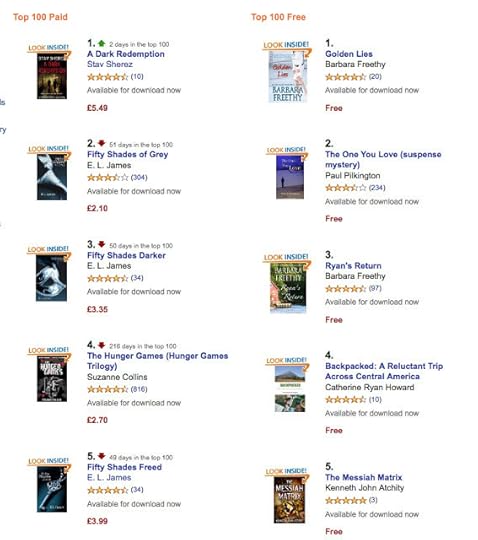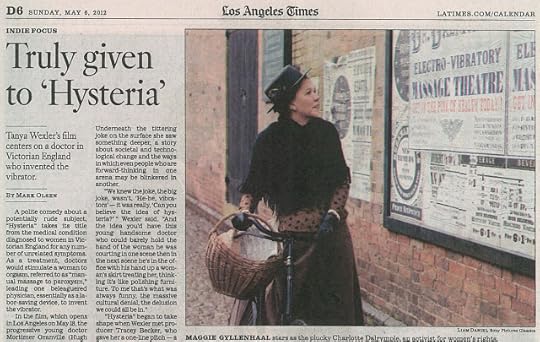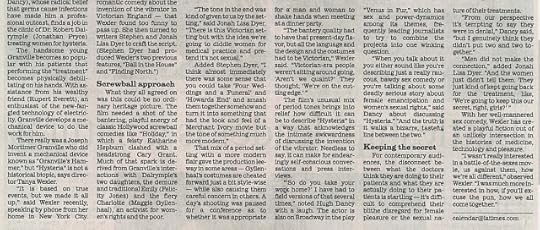Kenneth Atchity's Blog, page 238
May 10, 2012
What lengths would the Va...


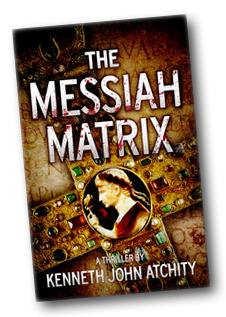
What lengths would the Vatican go to suppress the secret origins of their faith?
That's the premise behind The Messiah Matrix, a
consciousness-raising thriller whose protagonists delve into the
secrets of the past—and expose those who hide them still. Follow a
young, skeptical Jesuit priest and a vivacious, brilliant archaeologist
as they pursue their passion for truth—while fighting to control their
passion for each other. Together they uncover a Roman imperial
stratagem that leads them to unveil the Vatican's best-kept secret—a
secret so sensitive the Curia never wanted it to be known.
From the first page to the last this contemporary
thriller takes the reader on an exhilarating quest from the ancient city
of Caesarea to Rome's catacombs and beyond, and provides gripping
confirmation for all those who have ever wondered about the actual
historical existence of the "Christian Savior".
The Messiah Matrix may
prove to be the most thought-provoking thriller ever written. Classical
scholar and Yale Ph.D. Dr. Kenneth John Atchity is the only author
alive today capable of creating this literary and historically-based masterpiece.
"All that is hidden must now be revealed."

Published on May 10, 2012 09:38
May 9, 2012
Best Sellers in Historical Mysteries - Amazon
Top 100 Free

1.
The Messiah Matrix
Kenneth John Atchity
5.0 out of 5 stars (7)
Auto-delivered wirelessly
Free



1.
The Messiah Matrix
Kenneth John Atchity
5.0 out of 5 stars (7)
Auto-delivered wirelessly
Free

Published on May 09, 2012 09:58
Clint Hill's Moving Interview With Mike Wallace in 1975
Immediately following JFK's assassination, Agent Hill remained on Secret Service detail, protecting Mrs. Kennedy and her children, and was later assigned to the White House to protect Lyndon Johnson. But Hill was suffering from depression and was granted early retirement in 1975 at the age of 43.
That year, he agreed to speak publicly about the assassination for the first time in an interview with Mike Wallace at the Madison Hotel in Washington D.C. "Little did I know," Hill said later, "that it would turn out the way it turned out."
Emotion and remorse poured out of Hill during the interview, astonishing Wallace and Don Hewitt, who was then executive producer of the "60 Minutes" broadcast. "I had no idea what was coming," Wallace later said. The correspondent welled up with tears several times during the conversation and even tried to reassure Hill that no one blamed him for JFK's death. Wallace called it the saddest interview of his career.
Today, Clint Hill's memories of the assassination are much less painful, and he credits Wallace with jump-starting his mental-health recovery.

That year, he agreed to speak publicly about the assassination for the first time in an interview with Mike Wallace at the Madison Hotel in Washington D.C. "Little did I know," Hill said later, "that it would turn out the way it turned out."
Emotion and remorse poured out of Hill during the interview, astonishing Wallace and Don Hewitt, who was then executive producer of the "60 Minutes" broadcast. "I had no idea what was coming," Wallace later said. The correspondent welled up with tears several times during the conversation and even tried to reassure Hill that no one blamed him for JFK's death. Wallace called it the saddest interview of his career.
Today, Clint Hill's memories of the assassination are much less painful, and he credits Wallace with jump-starting his mental-health recovery.

Published on May 09, 2012 00:00
May 7, 2012
REGISTER FOR MY NEXT FREE WEBINAR TOMORROW MAY 8TH AT 2:30 PM (EST)
Writing Treatments that Sell
The treatment is a tool used by Hollywood writers to provide a
compelling overview of a story prior to writing or revising it. It’s as
useful as a marketing device as it is as a diagnostic tool, and some
treatments have even sold for millions of dollars. Based on his
bestselling book, Writing Treatments that Sell, Dr. Atchity will show
you what a treatment is and what you need to know about its essential
elements in order to add it immediately to your arsenal of professional
writing tools.
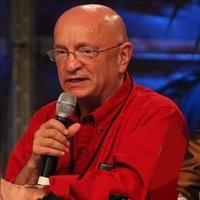 About the Presenter
About the PresenterDr. Atchity is the author of 15 books, including A Writer’s Time,
Writing Treatments That Sell, and How to Publish Your Novel. He’s worked
successfully in nearly every area of the publishing and entertainment
business, and has spent his lifetime helping writers get started with
and improve their careers. As founder and head of Atchity Entertainment
International, Inc., The Writer’s Lifeline, Inc., including Atchity
Productions and Story Merchant, and The Louisiana Wave Studio, LLC. he
has produced nearly 30 films in the past 20 years for major studios,
television broadcasters, and independent distribution. He is currently
nominated for an Emmy for “The Kennedy Detail,” based on the New York
Times bestselling book he developed. For nearly twenty years before, as
professor of literature and teacher of creative writing at Occidental
College and UCLA, he helped literally hundreds of writers find a market
for their work by bringing their craft and technique to the level of
their ambition and vision. During his time at Occidental, he also served
as a regular reviewer for The Los Angeles Times Book Review.
Register Now
May 8, 2012 at 02:30PM
May 31, 2012 at 02:30PM

Published on May 07, 2012 16:34
The Messiah Matrix Moved up from #5 to # 2 in Free Bestsellers in England this morning!
Published on May 07, 2012 10:00
May 6, 2012
Hysteria Indie Focus in Today's The Los Angeles Times
Published on May 06, 2012 00:00
May 4, 2012
STORY MERCHANT CLIENT ROBIN GOLDBERG WITH MR. AND MRS. ADAM SANDLER IN BOCA
Published on May 04, 2012 00:00
May 2, 2012
REGISTER FOR MY NEXT FREE WEBINAR ON MAY 8TH AT 2:30 PM (EST.)
Writing Treatments that Sell
The treatment is a tool used by Hollywood writers to provide a
compelling overview of a story prior to writing or revising it. It’s as
useful as a marketing device as it is as a diagnostic tool, and some
treatments have even sold for millions of dollars. Based on his
bestselling book, Writing Treatments that Sell, Dr. Atchity will show
you what a treatment is and what you need to know about its essential
elements in order to add it immediately to your arsenal of professional
writing tools.
 About the Presenter
About the PresenterDr. Atchity is the author of 15 books, including A Writer’s Time,
Writing Treatments That Sell, and How to Publish Your Novel. He’s worked
successfully in nearly every area of the publishing and entertainment
business, and has spent his lifetime helping writers get started with
and improve their careers. As founder and head of Atchity Entertainment
International, Inc., The Writer’s Lifeline, Inc., including Atchity
Productions and Story Merchant, and The Louisiana Wave Studio, LLC. he
has produced nearly 30 films in the past 20 years for major studios,
television broadcasters, and independent distribution. He is currently
nominated for an Emmy for “The Kennedy Detail,” based on the New York
Times bestselling book he developed. For nearly twenty years before, as
professor of literature and teacher of creative writing at Occidental
College and UCLA, he helped literally hundreds of writers find a market
for their work by bringing their craft and technique to the level of
their ambition and vision. During his time at Occidental, he also served
as a regular reviewer for The Los Angeles Times Book Review.
Register Now
May 8, 2012 at 02:30PM
May 31, 2012 at 02:30PM

Published on May 02, 2012 00:00
April 30, 2012
Story Merchant “Gold Sponsor.”
Published on April 30, 2012 00:00


